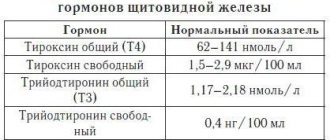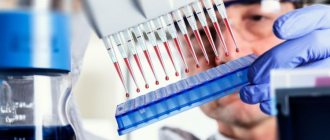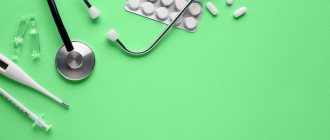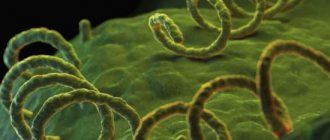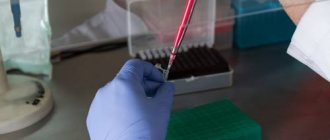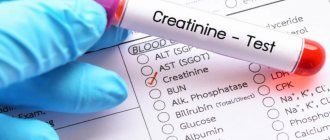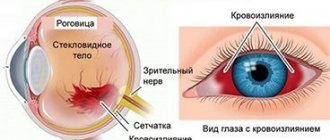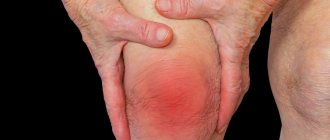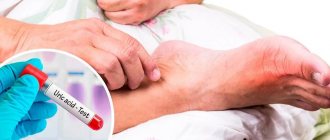Antibodies to cyclic citrullinated peptide are the main marker of rheumatoid polyarthritis in the early stages. Rheumatoid arthritis (RA) is a systemic disease characterized by predominant damage to the joints and quickly leading to disability if not diagnosed in a timely manner. As a result of disruption of the immune system, the body produces antibodies to the body's own cells and tissues, including proteins of the inflamed joint membrane containing citrulline. Immune complexes lead to joint damage (destruction and erosion). First of all, the small joints of the hands, feet, wrists and ankles, as well as the elbow and knee joints are affected; their damage is often symmetrical. In severe cases, other organs and tissues are involved.
Clinically, RA is manifested by pain in the joints, swelling and deformation, redness in the joint area, increased local and general temperature, and impaired motor activity. The hallmark symptom of rheumatoid arthritis is morning stiffness. If it lasts for a long time, there is a disturbance in movement in the joint up to complete immobility.
When RA is suspected, rheumatoid factor (RF) and C-reactive protein (CRP) are routine diagnostic tests. But these tests are not always informative; the levels of these indicators also increase in other autoimmune diseases.
The production of antibodies to cyclic citrullinated peptide begins 1–2 years before clinical manifestations and is characteristic primarily of RA, so ASCP is a highly informative and accurate test for diagnosing rheumatoid arthritis, allowing not only to make an early diagnosis and prescribe timely treatment, but also to differentiate between erosive and non-erosive arthritis. form of the disease. A high level of ASCP is associated with an erosive form that is more aggressive in its course, but it is not informative in assessing the effectiveness of treatment. To diagnose rapidly progressing forms of rheumatoid arthritis, an additional marker is used - antibodies to citrullinated vimentin (anti-MCV), which allows monitoring of therapy.
Analysis algorithm
Venous blood is taken for analysis
- Blood for ACCP is taken from a vein in the morning, always on an empty stomach. If the patient feels unwell, the doctor should be notified.
- The examination requires blood serum, which is obtained from the obtained sample by passing it through a centrifuge.
- The blood serum in a test tube is placed in a dark place for 7 days at an air temperature no higher than +20C.
- A week later, the blood is examined; it can first be frozen at a temperature of -2000 C. If the blood has been frozen, it is examined immediately; it cannot be thawed, frozen or stored again.
- The serum is examined using a laser, which can detect antibodies produced only by rheumatoid arthritis. The rheumatic test itself is carried out in a matter of minutes; blood preparation takes a long time.
The main thing is to find out the norm?
Most often, for some reason, readers first of all strive to find out the norm of the indicator, without delving into the essence of the problem. Probably to compare the values with the result of a blood test obtained in hand, and then figure out what’s what. You may have to somewhat disappoint those who are overly curious: any sources can only provide approximate norms - they depend on the method of conducting the study, as well as on the reference intervals adopted by a particular laboratory (in which, by the way, the answer options should be clarified). However, the desire of readers is the law, so it is probably worth satisfying the interest of our esteemed public and, before talking about antibodies to cyclic citrullinated peptide, provide their normal values.
For example, the answer after the ACDC study was conducted:
- The immunofluorescent method can be as follows: “negative” - this means up to 5 U/ml (normal). At the same time, the threshold values of ACCP = 5 U/ml give grounds to continue examining the patient;
- Using chemiluminescent immunoassay - up to 17 U/ml.
When testing by enzyme-linked immunosorbent assay (ELISA) using 2nd generation test systems (the “gold” standard for detecting ACCP), slightly different results can be expected:
| AT concentration, RU/ml* | Decoding |
| Less than 30 RU/ml | No antibodies to CCP were detected, “negative” |
| Interval: 30 – 90 RU/ml | AT content is low, the result is weakly positive |
| More than 90 RU/ml | High con |
*RU/ml – relative units per milliliter
Decoding the results
Of course, the doctor deciphers and interprets the results, as in the case of other laboratory tests, but there is no point in making a secret of this: those interested will still start searching for sources of knowledge, so it is advisable to give the main provisions:
- Determination of antibodies to CCP significantly increases the likelihood of diagnosing such a serious pathological process as rheumatoid arthritis. In the stage of early RA, detection of ACCP shows (together with other tests - RF) a fairly high sensitivity (80 - 85%);
- The study of the anti-CCP titer and comparison of the results with the nature of the disease and the inflammatory process should be carried out, guided by the classification diagnostic criteria for RA (ACR/EULAR). However, as a rule, a sharply increased titer in a blood test corresponds to high activity of the process, progression of symptoms and severe course of the disease;
- The negative value of the results, on the contrary, is encouraging: the risk of developing RA is small, but if this happens, the process will proceed slowly and not so painfully;
- It is recommended that the ASCP study be carried out with other laboratory indicators: RF, of course, antinuclear factor, as well as HLA typing to identify the HLA-B27 antigen (a marker of ankylosing spondylitis - ankylosing spondylitis).
And yet, I would like to once again remind readers that figuring out where is “positive” and where is “negative”, relying on the quantitative values of the ACDC given in various sources, is not very useful. Answers to questions regarding the standard should be sought in the laboratory that tested the biological material.
The need for early diagnosis
Rheumatoid arthritis is the most common chronic autoimmune disease, which is expressed by inflammation in the joints and the development of degenerative-dystrophic changes in them, and extra-articular manifestations of the disease. When joint tissue is damaged, the patient experiences the following symptoms:
- Joint pain;
- Swelling and redness of the skin in the area of the diseased joint;
- Movement restrictions;
- Impaired limb function;
- Morning stiffness.
As the disease progresses, inflammation of the joint progresses. This leads to the development of deformities and limitation of movement. At an early stage of the pathological process, there is a need for differential diagnosis of the disease. The rheumatologist pays attention to the typical symptoms of arthritis, the development of inflammatory joint damage, rheumatoid factor and the presence of ACCP. Early diagnosis of rheumatoid arthritis allows you to prescribe optimal treatment and prevent joint destruction. Severe cases of the disease are discussed at a meeting of the Expert Council of the Yusupov Hospital. Professors and doctors of the highest category take part in its work. Leading rheumatologists collectively develop patient management tactics.
Advantages of the ACDC test
This blood serum test is one of the most accurate, since it can be used to detect the disease at an early stage, when there are no visible symptoms yet.
ACCP has the following advantages compared to rheumatoid factor:
- allows you to identify rheumatoid arthritis at the initial stage – 70%;
- identifies the stage of disease progression – 79%;
- the accuracy of the results is 98%;
- predicts how the disease will develop, which makes it possible to prescribe timely and positive treatment;
- thanks to the test, antibodies to ACCP can be detected even before the first symptoms appear.
The method has proven itself to be highly accurate, which is why it is increasingly prescribed to patients with signs of arthritis.
Cyclic citrullinated peptide - what is it?
Citrulline itself, although an amino acid, behaves differently from other (standard) amino acids. Without interfering with proteins during their formation, citrulline remains apart from building proteins and is not included in their category, but at the same time it has a certain and, it should be noted, significant physiological function: it actively participates in metabolic processes (urea), maintaining the balance of nitrogen in body. Citrulline is a product of metabolic reactions of arginine (a nitrogen donor); in other cases, the transition of arginine to citrulline starts the production of cyclic citrullinated peptides. The citrullination reaction is observed during various biochemical transformations, both physiological and pathological.
Perceiving the cyclic citrullinated peptide as something foreign, the immune system, through local plasma cells of the inflamed synovium, responds by producing the corresponding immunoglobulins, the purpose of which is to attack the “enemy” and destroy it by forming an “antigen-antibody” complex. This is how the autoimmune process develops.
Experts believe that the immune reaction is triggered by proteins obtained in the synovium during citrullination. The reason for the formation of all antibodies to citrulline is the modification of certain proteins (vimentin, fibrin, etc.), when citrulline amino acid residues appear in the structural structure of these proteins. Protein modification occurs during the inflammatory response in the synovium in rheumatoid arthritis.
Preparation and delivery
To undergo the ACCP study, it is enough to give up some everyday moments in a few days.
- Smoking. One of the most dangerous habits from an analytical point of view. Causes an increased concentration of antibodies to CCP. True, the phenomenon is temporary. Therefore, you should quit smoking two to three days in advance. Otherwise, false results cannot be avoided. This means inappropriate actions on the part of the doctor.
- Drinking alcohol. Alcohol “works” in much the same way. Another condition is possible. Ethanol has the ability to reduce the concentration of a substance - therefore, the result will be false negative. This means rheumatoid arthritis will remain unattended.
Alcoholics are especially at risk in the second stage of addiction and beyond. Avoid alcohol several days before the test. It is desirable that the products of ethanol metabolism have time to leave.
- Physical exercise. Intense mechanical activity creates risks. During training, even if not at full strength, problems develop. A huge amount of cortisol, adrenaline, and catecholamines are released into the blood. They inhibit the functioning of the immune system and do not allow the clinical picture to fully manifest itself. Therefore, they give up physical activity in about 3-4 days.
- Overheating, temperature changes. For example, when visiting a bathhouse, sauna and suddenly going out into cold air. This is harmful because the immune system is again suppressed. Consequently, the concentration of antibodies to cyclic citrullinated peptide may decrease. You should not overheat or overcool for 3 days before the analysis.
- Avoiding certain medications. Only with the permission of doctors. Since unauthorized appointment can bring complications. The results are influenced by drugs such as anti-inflammatory drugs, especially hormonal ones. Also diuretics, immunosuppressants, oral contraceptives.
The question is complex. Before the study, it is worth clarifying the effect of the drugs and informing the doctor about the treatment being carried out. To the one who will decipher the diagnostic results.
- 30-40 minutes before the procedure you need to remain calm. Otherwise, adrenal hormones will distort the results.
The analysis is quite simple:
- The patient arrives at the clinic or laboratory at the appointed time.
- The specialist takes some blood from the vein. Places the sample in a test tube.
- Labels it and sends it to the laboratory.
- Then, after 1-2 days, the patient receives the results in his hands. Or the results are sent to the doctor who is treating the patient.
Everything takes a few minutes. Then it's up to the laboratory. From a technical point of view, the patient will not notice the difference between the analysis for ACCP and simple biochemistry.
Additional examinations
Supportive measures are prescribed to make a correct diagnosis. The list is something like this.
- Oral interview and history taking. It is important to identify the patient’s symptoms, health complaints, and his or her condition. Also determine the diagnostic vector.
- Measurement of antibody concentration.
- Ultrasound of joints.
- Ultrasound examination of the digestive tract.
- MRI/CT of cartilage structures.
Basically, this is enough. If necessary, additional procedures are prescribed.
ACCP is a marker of autoimmune processes in the body. It is mainly used to determine rheumatoid arthritis. But not only. We are talking about a subtle, sensitive technique.

